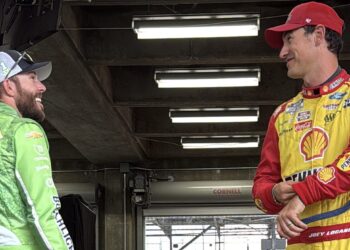In a stunning crossover between high-octane sports and speculative science fiction, NASCAR Cup Series champion Ryan Blaney has sparked a viral debate—not with his performance on the racetrack, but with an unexpected philosophical musing: what would have happened if dinosaurs had never gone extinct? Speaking in a recent podcast interview, Blaney—known for his cool demeanor and razor-sharp instincts—took a detour from drafting strategy to delve into the fate of humanity in a dinosaur-dominated timeline.
“We’d be toast,” Blaney declared bluntly. “There’s no way people could’ve evolved the same way with giant lizards stomping around. Civilization wouldn’t have had a chance to get off the ground.”
The comment, delivered with a mix of humor and sincerity, lit up social media and drew responses from fans, scientists, and fellow drivers alike. But what started as a throwaway comment soon ballooned into a genuine thought experiment: could humanity have ever emerged if the asteroid that wiped out the dinosaurs had missed Earth?
The Blaney Effect: When NASCAR Meets Paleontology
Blaney’s off-the-cuff remarks tapped into a long-standing curiosity shared by scientists and sci-fi writers alike. The extinction event 66 million years ago, believed to have been triggered by a massive asteroid impact near modern-day Mexico, ended the reign of non-avian dinosaurs and gave mammals a chance to rise. Without that cataclysmic reset, Earth’s evolutionary path would have been dramatically different.
Blaney, the 2023 NASCAR Cup Series champion and one of the sport’s most relatable figures, is known for his down-to-earth personality and nerdy interests—ranging from Star Wars to space exploration. That reputation made his fans take his dino-speculation seriously.
“You never expect a NASCAR champion to casually break down evolutionary biology mid-interview,” said Emily Corrigan, a biology professor at UNC Chapel Hill. “But Blaney actually isn’t wrong. Dinosaurs dominated every ecosystem for millions of years. Without their extinction, early mammals might have remained small, nocturnal creatures.”
A World Where Dinosaurs Never Left
Let’s imagine Blaney’s vision: a world where the asteroid missed, and dinosaurs never went extinct. Scientists believe that if the Cretaceous period had continued uninterrupted, intelligent life—at least as we know it—might not have emerged.
In such a world, predatory dinosaurs like Tyrannosaurus rex and Velociraptor would have continued to dominate terrestrial life. Herbivorous behemoths like Triceratops and Brachiosaurus would have maintained their stronghold over forests and plains. Mammals—small, burrowing, and insignificant—would never have had the evolutionary breathing room to diversify.
“It’s like trying to build New York City in the middle of Jurassic Park,” Blaney joked. “You’re not laying down train tracks or building factories when there’s a 40-foot dinosaur eyeing you like lunch.”
Even more provocatively, Blaney suggested that the dinosaurs themselves might have evolved further. “Who knows,” he mused. “Maybe they’d be the intelligent species now. Maybe there’d be raptors with race cars.”
That idea—though far-fetched—has been entertained by some evolutionary biologists. Dale Russell, a paleontologist from Canada, once proposed the concept of a “dinosauroid,” an intelligent, bipedal descendant of Troodon, a highly intelligent theropod dinosaur. While most scientists view the theory as highly speculative, it makes for a fun sci-fi twist: if the asteroid missed, maybe Earth would be ruled by intelligent reptiles, not humans.
Why This Matters More Than You Think
While Blaney’s remarks were delivered with a twinkle in his eye, they touch on deeper questions about chance, survival, and destiny. The idea that humanity owes its existence to a random space rock millions of years ago is both humbling and unsettling.
“It reminds us that we’re here by a cosmic accident,” said Dr. Lisa Hawthorne, an astrobiologist with NASA. “Without that asteroid, mammals—and humans—might never have had their moment. It’s a reminder of how fragile and precious our time on Earth is.”
Blaney’s unexpected philosophical tangent also shows the power of public figures engaging with science. His comments have sparked renewed interest in dinosaur extinction, evolution, and what it means to be human.
“I came for racing,” one fan tweeted, “but stayed for the existential dinosaur debate. Blaney 4 president.”
From the Track to the Timeline of Life
It’s easy to dismiss celebrity musings as fluff, but Ryan Blaney’s comments offer more than just amusement. They serve as a gateway to curiosity, encouraging fans of all ages to ponder the incredible twists of fate that shape our world.
In a sport defined by speed, risk, and split-second decisions, Blaney understands better than most how small changes can lead to vastly different outcomes. Whether it’s choosing when to pit or pondering prehistoric history, his instinct for timing remains uncanny.
As for whether he’ll continue to explore alternative timelines and evolutionary what-ifs in future interviews, Blaney smiled and shrugged: “Maybe I’ll start a podcast—‘Fast Cars and Faster Extinctions.’ Wouldn’t that be something?”











